Understanding Nurse Burnout in Dementia Care
THE CAUSES AND IMPACTS OF NURSE BURNOUT IN DEMENTIA SETTINGS
Introduction:
Nurse burn out in the dementia setting is a matter of great concern in modern nursing field. PHE (2019) mentioned that, many cases of nurse burnout have been registered in the NHS hospitals in which nurses experience several factors that lead to their burnout (PHE, 2019). These factors are the lack of support and respect from senior healthcare professionals, poor remuneration as compared to the effort and time nurses invest in their work, overburden of task and lack of career development opportunities in the workplace (Hunt et al. 2017). Nurse burnout not only interfere with the skill and ability of adult nurses working in the dementia ward to provide the high standard care to the patients but also impacts adversely on the mental and physical well-being of nurses. Seeking nursing dissertation help can be crucial in exploring this issue further, offering insights into effective strategies to mitigate burnout.
Burnout in adult nursing has become a major concern in modern healthcare (Padilha et al. 2017). Nurse burnout is defined as the phenomenon in which nurses suffer from a continuous reduction of their energy, causing emotional exhaustion (Fernandes et al. 2017). According to Fernandes et al. (2017) nurse burnout is a common phenomenon in adult nursing in dementia settings, in which adult nurses experience severe psychological and emotional distress, lack of motivation and feelings of frustration. The evidence suggests that, adult nurses working in the dementia setting in the UK are more likely to experience the burnout that impacts on their physical, emotional and psychological wellbeing (Aldaz et al. 2019). In the UK adult nurses who work in the dementia ward are exposed to more abuse, harm, humiliation, poor salary structure, lack of financial and health security, lack of health and safety at workplace and poor cooperation from their patients and patient’s family members as compared to the other nursing professionals (Fernandes et al. 2017). As mentioned by Aldaz et al. (2019), as compared to nurses working in other settings the adult nurses working in the dementia setting are more emotional as well as sensitive and empathetic that make it difficult for them to cope up with the challenges and difficulties in their professional field. Pieces of evidence suggest as compared to the others setting, adult nurses who work in dementia setting have to take more stress and workload because of the lack of decision making and cognitive skill of their patients (Padilha et al. 2017). Dementia patients are unable to express their needs, pain and preferences which pose extra burden on the adult nurses who work in dementia ward to provide safe and high-quality care to patients (Aldaz et al. 2019). In the UK, adult nurses who work in the dementia ward of NHS hospitals experience higher workload and job stress as compared to the nurses who work in the others setting (Halter et al. 2017). On the other hand, evidences suggest that, adult nurses working in dementia setting in the UK do not get the remuneration that they deserve in return of the huge effect they contribute.  Low salary and lack of incentives or salary hikes for the nurses who work in the dementia ward are the major factors that lead to burnout in adult nurses (Fernandes et al. 2017). Although structure of work process and designation of nurses who work in other ward (not in dementia ward) are different based on which their salary is provided, it is acknowledged that adult nurses working in the dementia ward receive a minimum salary as return of their huge effort that is unable to meet their financial needs (Aldaz et al. 2019). Adult nurses who work in dementia ward in the UK are more likely to experience the poor cooperation, abuse and aggression from the patients, patient’s family members and doctors that pose adverse impact on their overall mental and physical wellbeing (Fernandes et al. 2017). In this context, the selection of this topic is highly relevant and aims to provide new insight into the impacts and causes of nurse’s burnout on adult nurses in dementia settings. This research study not only provides a new insight on the adverse impacts of nurse burnout in dementia ward on the ability of adult nurses to deliver compassionate care to dementia patients but also present the effective strategies that healthcare organisations can implement into practices to reduce the case of nurses burnout.
Low salary and lack of incentives or salary hikes for the nurses who work in the dementia ward are the major factors that lead to burnout in adult nurses (Fernandes et al. 2017). Although structure of work process and designation of nurses who work in other ward (not in dementia ward) are different based on which their salary is provided, it is acknowledged that adult nurses working in the dementia ward receive a minimum salary as return of their huge effort that is unable to meet their financial needs (Aldaz et al. 2019). Adult nurses who work in dementia ward in the UK are more likely to experience the poor cooperation, abuse and aggression from the patients, patient’s family members and doctors that pose adverse impact on their overall mental and physical wellbeing (Fernandes et al. 2017). In this context, the selection of this topic is highly relevant and aims to provide new insight into the impacts and causes of nurse’s burnout on adult nurses in dementia settings. This research study not only provides a new insight on the adverse impacts of nurse burnout in dementia ward on the ability of adult nurses to deliver compassionate care to dementia patients but also present the effective strategies that healthcare organisations can implement into practices to reduce the case of nurses burnout.
Search strategy:
In every secondary research, researchers need to use relevant search strategy to search for appropriate and valid literature (Tricco et al. 2018). Search strategy can be defined as the process through which relevant literature can be searched that assists researchers to use the relevant as well as authentic information to meet the research objectives and research aim (Eriksen, and Frandsen, 2018).
In this study researcher used the appropriate key terms to select the relevant literature on the research topic. Here the researcher used online databases such as CINAHL, British National Index and MEDLINE. By using these database researchers used appropriate key terms to collect the authentic, highly relevant and accessible research papers. Boolean operations (‘AND’ ‘OR’) are used while using the key terms for searching for the relevant literature,
The following table shows what key terms were used while selecting the online articles through using the online database:
Key terms:
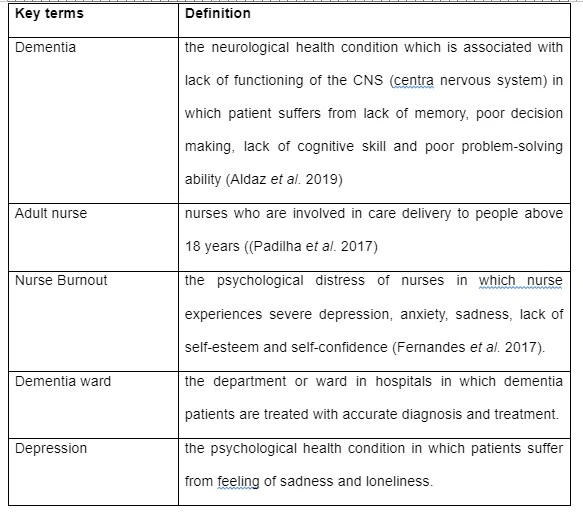
Article selection by using PRISMA:
PRISMA is one of the highly preferred tools that assists the researcher to demonstrate the results of a search (Tricco et al. 2018). Here researcher used PRISMA tool, to demonstrate how the relevant articles were selected for the study. PRISMA enabled researcher to demonstrate the entire process of shortlisting and selecting the literature systematically (Selçuk, 2019). By using the PRISMA tool, relevant literature was selected in systematic steps. Here key terms related to the research topic were used to identify the appropriate articles. [Refers to appendix 1]
Initially a total of 40 articles were searched for carrying out this research. These 40 articles were selected from the above-mentioned databases (MEDLINE, CINAHL and BNI). Researchers must use valid and authentic search strategies to select relevant articles that can assist the research study to meet research objectives (Hoffman et al. 2020). Shortlisting of these articles was done by first identifying the duplicates of selected articles and then removing them from the list. As mentioned by Flipse (2019), duplicate-removal is important for researchers to use the most authentic and valid evidence in their study. After removing 5 duplicates, there were 35 articles in the list. A screening method was then applied in which the inclusion and exclusion criteria were used by the researcher to select such articles that met the criteria. Under the inclusion and exclusion criteria, the researcher has checked the relevance of the research elements, research content, abstract, reference list, data collection and data findings of research paper. As mentioned by Selçuk (2019), screening is the process of evaluating the relevance and appropriateness of selected articles to the research topic. After carrying out the screening process 10 articles are excluded from the list based on the lack of information, irrelevant database and lack of all research elements. As a result, 25 research articles were obtained from the search. After that, again a screening was carried out of the 25 articles to evaluate the accessibility of each article. As mentioned by Feng et al. (2019) researchers must select articles that can be easily accessed and downloaded from the online databases. Through this screening it was seen that except 5 articles out of the 25 articles the other 20 articles are the full text articles that can be easily accessed and downloaded from the online databases. Therefore 20 articles were selected. Then the final screening was carried out to analyse the quality of the literature review of these articles in terms of providing the relevant information to researcher. In this screening test the relevance of the literature review and data findings of each research article had been checked. Through the screening test it was seen that only 5 articles out of these 20 articles have the extended literature review that had the relevant and authentic information in relation to the research topic. Finally, these 5 literatures were selected for this study.
Literature review:
Nurse burnout is a great matter of concern in recent times as it poses adverse impacts on mental strength and wellbeing of nurses (Hunt et al. 2017). Adult nurses who work in the dementia ward of NHS hospital in the UK, have to face several challenges such as abuse, harassment, bully, unsupportiveness of doctors, lack of cooperation from the dementia patients and their family members and lack of financial and health security at the workplace (Aldaz et al. 2019). As stated by Hunt et al. (2017), in dementia setting adult nurses have to deal with excessive workload thar are more than twice than the workload experiences by the nurses working in other settings. Although dealing with more extreme job stress, the adult nurses of dementia ward receive a salary that is lower than the nurses working in the other setting (Fernandes et al. 2017). On the other hand, adult nurses in dementia ward have to face extreme mental and emotional abuse by the dementia patients and their family members that make them more prone to psychological illness as compared to nurses in other settings (Padilha et al. 2017). For example, adult nurses face severe arrogant attitude and abuses from patients while they avoid the wrong preferences and demand of patients as the fulfilment of these demands can cause health risk to patients. Unlike other patients, dementia patients lack their decision-making ability and ability to perform the regular activities. This is why adult nurses invest their more effort and time to provide more care and protection to these patients as compared to the other nurses do for the patients in other setting (Hunt et al. 2017). Adult nurses are highly prone to make mistakes in their work as they have to deal with many tasks in a day that make them more vulnerable to face the harassment, bully and abuse from their colleagues, healthcare professionals and patient’s family members that cause their emotional, spiritual and psychological distress. While dealing with mental patients, it is highly stressful for adult nurses to remind all the activities to the patients that they frequently forget (Aldaz et al. 2019). Additionally, the Public Health England (2015), has shown that in the NHS hospitals adult nurses working in the dementia ward are assigned with more workloads than the aged and senior nurses which create a level of dissatisfaction and feeling of bias in the mind of the adult nurses [PHE, 2015]. This is why most adult nurses suffer from lack of job satisfaction, depression and anxiety (Hunt et al. 2017). On the other hand, there are many cases in which adult nurses face bully and abuse by the dementia patients and their family members, which cause the emotional and psychological distress in the nurses (Aldaz et al. 2019). Evidence suggests that adult nurses working in dementia ward have to deal with several impediments in their practice such as of many reasons such as long working hours, tough schedule, manifold responsibilities, disrespects from the patients and their family members, harassment and bullying by the patients and the doctors and lack of financial rewards. This is why adult nurses are more prone to make mistake and errors in their practices than the nurses who work in other setting for which adult burses wring in dementia setting face severe bullying, mental trauma and harassment by their mentors and the team leaders which pose adverse impacts in their psychology (Fernandes et al. 2017).
It is evident that adult nurses working with dementia patients has to deal with the severe workload as compared to the other wards because here the patients are unable to take any decision regarding their treatment, therefore, adults nurses play manifold roles such as care delivery to patients, communicate with their family and friends to get detailed information about patients, carry out the health assessment of the patients, conduct physical test for patients, checking regular health of the patients and maintaining strong information delivery in the ward. Although adult nurses working in the dementia ward work overnight, the remuneration they get is highly small as compared to the labour they give (Aldaz et al. 2019). Nurses’ burnout is the potential reason behind the reduction of work engagement and work motivation for the adult nurses who work in dementia wards, which not only reduces the overall productivity of the entire workforces but also interferes with the quality of the care delivery to a dementia patient (Fernandes et al. 2017). As mentioned by Halter et al. (2017), adult nurses who work in a multidisciplinary team under the mentorship of senior nurses face the high level of domination and mental pressures from the mentors and senior doctors which pose adverse impacts on their health and wellbeing (Fernandes et al. 2017). For combating the nurse burnout, the healthcare authority needs to provide a safe, positive and supportive work environment to nurses working in a dementia ward, in which they can get proper assistance and guidance from the seniors. In addition to this, the healthcare authority must ensure that the basic needs of nurses are met properly such as economic, social, physical and psychological needs.
Critical appraisal of selected articles by using CASP tool:
Article 1:
Fernandes, L.S., Nitsche, M.J.T. and Godoy, I.D., 2017. Burnout syndrome in nursing professionals from an intensive care unit. Revista de Pesquisa: Cuidado é Fundamental Online, 9(2), pp.551-557.
A critical analysis using the CASP tool:
For presenting the critical analysis of the selected article CASP (critical appraisal skill programme) tools were used. CASP tools are widely used tools that are used by academic researchers to analyse any research paper. Here the in-depth analysis of the above-mentioned research paper is presented by using by CASP tool.
Description:
The paper “Burnout syndrome in nursing professionals from an intensive care unit” mentions a clear objective which is to assess burnout levels of the nurses working in an intensive care unit (Fernandes et al. 2017). Here the paper presents the quantitative research in which 47 nurses who work in the ICU in a public hospital are selected. Researchers have used a self-administered questionnaire and a burnout inventory. Additionally, a Wald test was also conducted in this study. Results showed that 93% of participants had low job satisfaction and 74% had severe exhaustion. Examination also shows that 94% of the participants suffer from depersonalisation (Fernandes et al. 2017).
From the discussion, it can be described that nurses working in the critical healthcare wards such as ICU and dementia ward suffer from the high level of burn out which pose adverse impacts on their self-esteem and psychology (Fernandes et al. 2017). This paper has presented the strong argument that reasons for burnout are not only associated with harassment and low salary in the workplace, but also that nurses can suffer from the depression due to their lack of skill and expertise that potentially make them face severe inferiority complexes. In this context, this quantitative paper highlights the fact that adult nurses who work in the intensive care unit or other critical care unit need to be provided with proper economic support, guidance, safe and supported workplace and training and development facilities, which will reduce their level of exhaustion and will improve their employee engagement (Fernandes et al. 2017).
Appraisal:

In the selected quantitative research paper Fernandes et al. (2017) have mentioned that nurses working in the ICU are more likely to suffer from mental trauma, depression and low job satisfaction. The paper has a clear abstract, in which the aims and objectives of the paper are mentioned. On the other hand, it has a brief methodology which shows that the descriptive study design and quantitative approach have been used to analyse the experience of the adult ICU nurses regarding their burnout in the ward. In the method section, Fernandes et al. (2017) presents a clear discussion about how the participants are invited for the data collection and what criteria are used for the data analysis. In the methodology section, the paper mentioned that adult nurse who works in the ICU and other critical wards such as dementia ward, they have to deal with lots of stress and issues, which not only pose adverse impacts on their psychology and mental strength but also reduces their self-esteem. In this context, Padilha et al. (2017) has presented an in-depth study in which the workload stress level, burn out and satisfaction level of nurses are analysed. As compared to the above-mentioned article, in this research article, there is no clear description of the research design, however, there is the clear description of the data findings and data analysis which present the fact that nurses, especially the adult nurses work in dementia ward and critical care unit experience severe stress.
In another article, Aldaz et al. (2019) has presented a clear study design in which the issues regarding the burn out in adult nursing are addressed. On the other hand, article Halter et al. (2017), has presented clear objectives, study design and data finding sections which presented the fact that adult nurses face severe mental distress and emotional distress due to the burnout. Here the researchers have successfully highlighted the research gaps and research limitation in carrying out the research. White et al. (2019), has mentioned in their article lack of nursing care due to improper resources and time is the potential reason behind the job dissatisfaction and burnout of registered nurses. It also shows how burnout changes the behaviour and attitude of health professionals towards adult nurses in the workplace.
Evaluation:
From evaluating all the above-mentioned articles, it is evaluated that, all the articles highlight the on major aspects that have the adverse impacts of nursing burn out on the lifestyle, health and wellbeing of the adult nurses. Through analysing finding of all the selected articles, it can be stated that each article can meet the research objectives by presenting a clear and comprehensive discussion on the burn out in adult nursing. Evaluation of the other four articles:
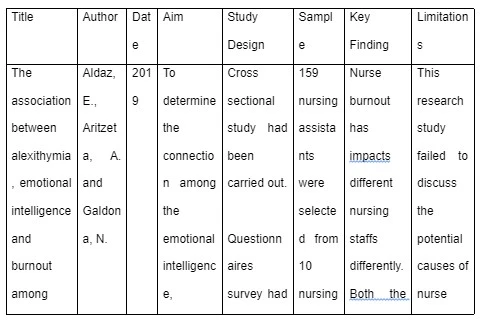

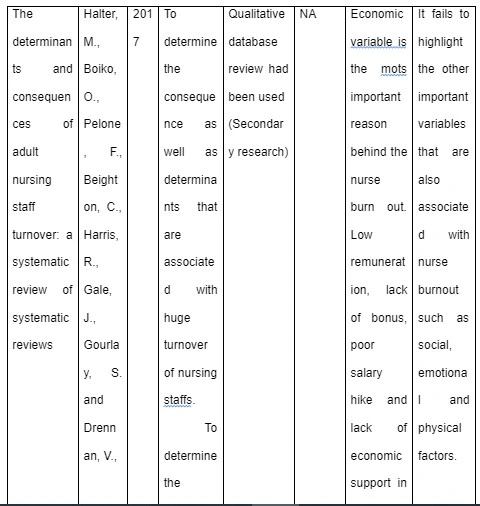
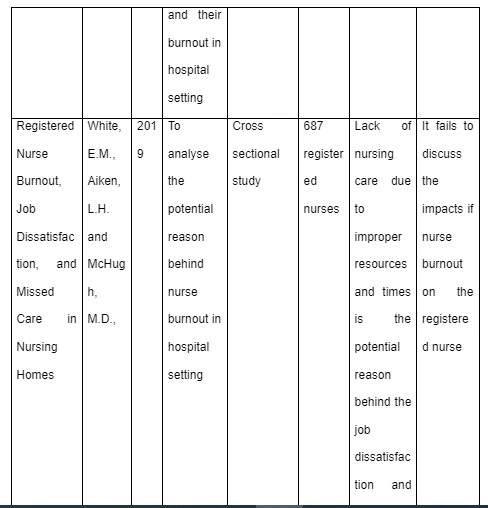
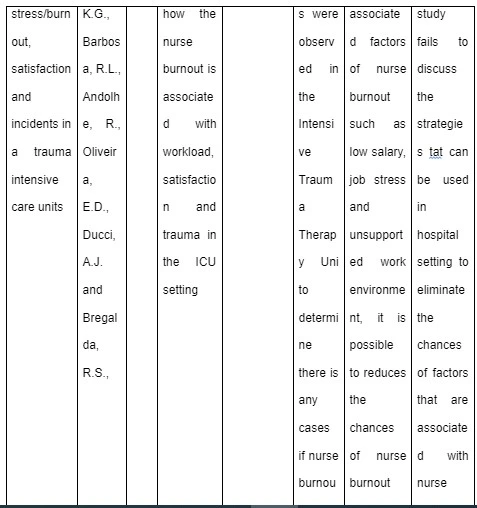
Conclusion:
From the overall discussion, it can be concluded that nurse burn out is a great matter of concern in current nursing practices. Nurse burnout can be considered as the phenomena, in which nurses feel depressed, anxious and frustrated. Nurse-burn out is more common in adult nursing practice than in any other segment of healthcare. Especially in the case of adult nurses who work in the dementia ward are more likely to experience the burnout than other nurses. This is because in dementia ward adult nurses have huge workloads such as overnight schedule and long work hours. In dementia ward, adult nurse experiences bully and harassment by patients, their family members and doctors. The burnout increases chances of physical and emotional distress in nurses which can cause much mental illness.
From the overall discussion, it can be recommended that for reducing the chances of exposure of nurses to the burn out following strategies can be applied:
Healthcare authority must provide financial reward to nurses
Nurses would be provided with a positive and supportive workplace
Nurses working in the dementia ward would be provided with a safe and supportive environment
Healthcare authority will ensure to meet all the basic needs of nurses
Provide with accurate resources and trainings (ex. training about dementia, capacity and restraint training)
Recommendations:
Following recommendations can be made to reduce the burn out of the adult nurses working in the dementia setting in the UK:
Conducting stress management training for nurses:
Healthcare authority must conduct the effective training program for the adult nurses working in the dementia setting (Aldaz et al. 2019). This training program will improve the stress management skill and coping ability of adult nurses who work with dementia patients. As mentioned by Edwards et al. (2014), training is highly useful strategy in terms is eliminating the chances of nurse burnout in dementia ward, as because throughout the training program, adult nurses will be taught how to cope up with different difficult situation in the dementia ward. . The purpose of this training program is to develop the resilience, self-confidence and adaptability level of adult nurses working in the dement setting to improve their ability to cope up with any situation in their workplace.
Reducing individual workload:
The healthcare authority should develop an effective task-delegation system which will distribute the task systemically among the adult nurses who work in dementia setting thereby reducing the individual job stress and workload on them (Groot et al. 2016). Healthcare manager must be well-trained in delegating task in such a manner that will ensure that each nurse is provided with tasks based on his or her individual capacity and competence.
Developing supportive workplace:
For reducing burnout in adult nurse working in dementia setting, healthcare authority must develop a supportive and positive work environment. According to Padilha et al. (2017), adult nurses must be provided with such a work place environment in which they get the respect, support and care from the seniors and collegiums, which will not only motivate them towards their work but also reduce their stress. Healthcare authority must ensure that the autonomy, dignity and self-resect of each adult nurse will be maintained properly (Fernandes et al. 2017). Moreover, healthcare manager must ensure that in the dementia ward adult nurses will be protected from any kind of harassment, abuse and harm from patients and care professionals.
Promoting positive engagement into work:
By rewarding adult nurses who work deliberately in the dementia setting it is possible to keep them motivated and engaged into the work. As mentioned by Chiao et al. (2015). healthcare authority should appreciate the tireless effort of the adult nurses in the dementia ward thereby providing them proper rewards that they deserve. The rewards can be salary hike, promotion, incentives and bonus. Moreover, healthcare managers and higher officials must provide the emotional support to the adult nurses who failed to meet their work target in the dementia setting thereby enhancing their self-confidence and self-esteem to make better attempt.
Promoting positive health and wellbeing of adult nurse:
As adult nurses put their best effort to play manifold roles while working with dementia patient, healthcare authority must take the responsibility of providing good healthcare support to the nurses. Adult nurses working in the dementia setting must be provided with free health check up on monthly basis at their workplace, which will help them as to know about their current health condition (Eriksen and Frandsen, 2018). Healthcare authority must ensure that in the dementia ward there is proper walking space for nurses, proper hygienic environment, working desk and proper siting facilities for nurses. Adult nurses in the dementia wards must have the access to the good quality foods and drinks in the workplace, a relaxation area (canteen or coffee place) and fresh air, that will promote their positive physical and emotional wellbeing (Groot et al. 2016).
Reference list:
Aldaz, E., Aritzeta, A. and Galdona, N., 2019. The association between alexithymia, emotional intelligence and burnout among nursing assistants working in nursing home settings: A cross‐sectional study. Journal of advanced nursing, 75(11), pp.2786-2796.
Chiao, C. Y., Wu, H. S., & Hsiao, C. Y. (2015). Caregiver burden for informal caregivers of patients with dementia: A systematic review. International nursing review, 62(3), 340-350.
Edwards, R., Voss, S., & Iliffe, S. (2014). Education about dementia in primary care: Is person-centredness the key? Dementia, 13(1), 111-119.
Eriksen, M.B. and Frandsen, T.F., 2018. The impact of patient, intervention, comparison, outcome (PICO) as a search strategy tool on literature search quality: a systematic review. Journal of the Medical Library Association: JMLA, 106(4), p.420.
Fernandes, L.S., Nitsche, M.J.T. and Godoy, I.D., 2017. Burnout syndrome in nursing professionals from an intensive care unit. Revista de Pesquisa: Cuidado é Fundamental Online, 9(2), pp.551-557.
Groot, C., Hooghiemstra, A. M., Raijmakers, P. G. H. M., Van Berckel, B. N. M., Scheltens, P., Scherder, E. J. A., ... & Ossenkoppele, R. (2016). The effect of physical activity on cognitive function in patients with dementia: a meta-analysis of randomised control trials. Ageing research reviews, 25, 13-23.
Halter, M., Boiko, O., Pelone, F., Beighton, C., Harris, R., Gale, J., Gourlay, S. and Drennan, V., 2017. The determinants and consequences of adult nursing staff turnover: a systematic review of systematic reviews. BMC health services research, 17(1), pp.1-20.
Padilha, K.G., Barbosa, R.L., Andolhe, R., Oliveira, E.D., Ducci, A.J. and Bregalda, R.S., 2017. Nursing workload, stress/burnout, satisfaction and incidents in a trauma intensive care units. Texto Contexto Enferm, 26(3), p.e1720016
Selçuk, A.A., 2019. A guide for systematic reviews: PRISMA. Turkish archives of otorhinolaryngology, 57(1), p.57.

Dig deeper into Transformational Leadership in Nursing Practice with our selection of articles.
- 24/7 Customer Support
- 100% Customer Satisfaction
- No Privacy Violation
- Quick Services
- Subject Experts



